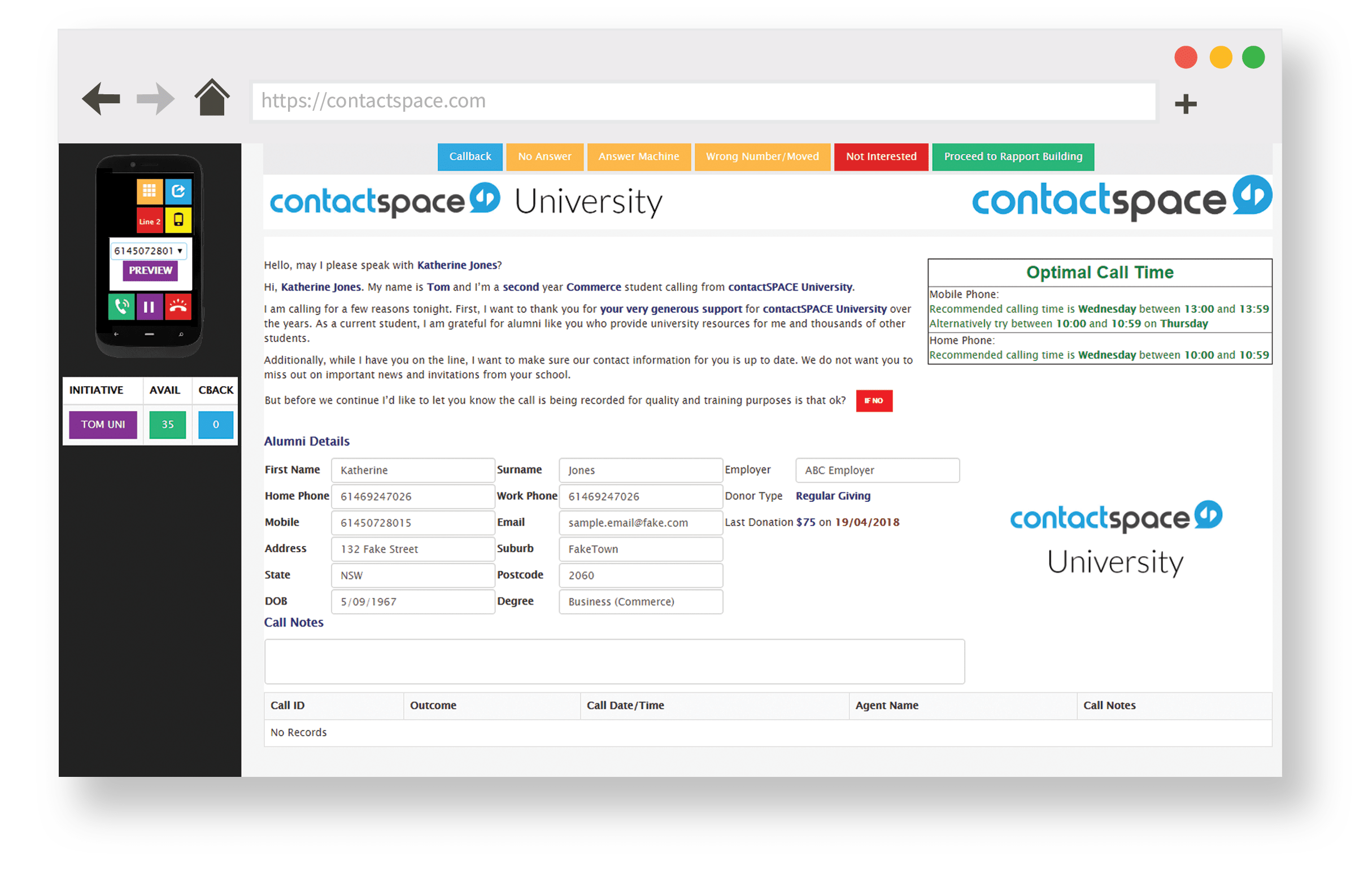A successful phonathon can be an incredibly powerful way to raise funds for your university, and improve alumni engagement.
Phonathons empower universities to do more social good, such as through funding research and scholarship programs. Plus, when executed the right way, alumni engagement campaigns also help your alumni to feel more connected with your institution, encouraging their involvement in alumni reunions, volunteering/student mentorship programs, and potentially post-graduate study.
In this guide, we’ve explained seven different phonathon best practices, used by university advancement teams to improve fundraising results.
1. Match the right caller with the right alumni

One of the most important aspects of a successful phonathon campaign is the quality of the conversations you’re able to generate between student callers and your alumni. The more natural the conversation, and the more common interests the student and alumni have, the more likely you are to achieve a positive result.
Therefore, it’s hugely important to ensure that the right student callers are engaging with the right alumni.
On the most basic level, you can match students based on their degrees and majors, such as matching students studying medicine with alumni who graduated with medical degrees.
However, you can also perform more advanced matching, based on things such as:
- Extra-curricular activities
- Causes they care about (this could be based on an alumni’s previous donation history)
- Other shared interests, such as sports or history
The more shared interests the two parties have, the better. Remember, this is important to help break the ice during the conversation, and to help establish a connection. The type of link between student and alumni is not the most important thing – what’s crucial is how you use this connection to make the conversation more successful, which we’ll discuss below.
2. Equip student callers for success

As a phonathon manager, you likely have a team of bright, enthusiastic student callers helping your university achieve its fundraising goals.
Despite this, making successful phonathon calls is not always easy – your student callers need the right support to be successful.
Importantly, you want to give your callers guidance to help ensure successful messaging. However, you don’t want to script each call word-for-word, otherwise things will begin to sound forced or false.
With the right structure in place, it won’t take hundreds of calls for each caller to become great at their job – they’ll hit the ground running from the moment they come on board.
You also need to provide relevant contextual information about the alumni, such as their interests, their majors, their donation history, and when they graduated. This information can’t be hidden away in a small CRM field at the corner of the screen, or in another window – important details need to be front and centre.
Here at contactSPACE, our university customers take advantage of contactSPACE CallGuides, to build intuitive call workflows and messaging frameworks.

On the CallGuide, key information is displayed at each stage of the call. As the conversation progresses, the student caller clicks forward through their workflow, allowing them to access further guidance on their messaging strategy. During and at the end of the call, agents can easily log call outcomes and write notes, ensuring you capture the data you need to better-engage your university alumni.
Here’s how one university described how they use contactSPACE CallGuides:
“Callers press a button and all the information is there at their fingertips. If they want to swap between different causes, or view information for different stages of the call, they can.”
Read the full case study to learn how this alumni engagement team used contactSPACE to nearly triple their average donation amount.
3. Use smart outbound dialing strategies

One of the biggest mistakes alumni engagement teams make is burning through good contact information by making calls without a sound dialing strategy.
Here are some examples of the outbound dialing issues it’s important to avoid:
- Failing to rotate your CLIDs (the phone numbers you display when dialing), resulting in carriers flagging you as a spam caller. It’s important to keep an eye on answer rates by CLID, and swap to a new number if you notice a drop-off. Also, best practice is typically to try a different CLID on each attempt of a given graduate, to maximize your chances of reaching them.
- Calling people at a time of day they are less likely to answer the phone, for example, when they’re at work.
- Calling people at a time they don’t want to answer the phone, for example, when they arrive home after work. Think about this: if a contact fails to answer at 6pm on a weekday, why not try them at a different time of day on the second attempt?
- Mis-timing calls in the context of the alumni’s relationship with your university. You don’t want to call them too soon after they just donated. Likewise, you don’t want to wait too long, to the point they become disengaged.
- Failing to focus on your best possible contact at any given moment. Ideally, to maximize fundraising results, you want to be calling the person most likely to donate right now.
- Failing to segment and identify trends in the data. This relates to the above point. It’s important to identify trends in your data, so that you can focus your efforts on the alumni most likely to help you achieve the results you’re after. For example, you might notice better engagement from alumni who live in a certain area, or who studied a certain degree.
- Failing to shelve a given record after a certain number of failed attempts. If you’ve tried to call a certain alumni five times and haven’t reached them, it’s probably best to move on to better data. You might also like to shelve a given record after just one or two attempts, depending on the failure reason. If the number is disconnected, it’s probably not worth trying it more than once – instead, call someone else, or try their home phone, rather than their mobile.
With contactSPACE Intelligent Outbound, you can spend more time speaking with your alumni, and achieve better outbound calling results. You can design smart dialing strategies that help maximize your chances of getting in contact and talking to alumni who are ready to contribute to your cause.
4. Use omnichannel contact to improve your alumni experience

In this day and age, omnichannel contact can be an incredibly powerful way of improving alumni engagement and fundraising results. An Omnisend study found that marketing campaigns that involve at least one SMS engagement were 48% more likely to end in a conversion.
There are a number of ways you can use alternative communication channels to improve your alumni engagement campaigns. Here are some example ideas:
- Broadcast email or SMS notifications, to generate engagement. For example, you might want to remind alumni interested in volunteering that there is an event coming up that they may like to participate in. Or, you might like to SMS alumni to let them know you’re going to call in the afternoon, and display a number they can call back, if they would like to speak immediately. You can use all of these broadcasting strategies and more with contactSPACE Intellicast.
- Send SMS reminders about events that alumni have expressed an interest in. For example, you might be fundraising for a specific cause, with a specific deadline. If an alumni is likely to be interested in this initiative, you could send them an SMS reminder about the opportunity, followed up with a call a day later.
- Send donation email or SMS confirmations, to improve your customer experience. With contactSPACE, you can do this automatically, when a caller logs a call outcome. You can also set up templates, giving the caller the opportunity to customise the confirmation message based on the conversation they had.
5. Be smart about your ask amount

One of the simplest ways to improve phonathon performance is to ensure you’re asking each alumni to contribute the right amount of money.
This may seem quite a complex thing to get right. How do you know how much is too much, or too little to ask?
The first step is to look at your data from previous calls or phonathon campaigns. Do you notice any trends in how fundraising results vary depending on the ask amount? Do different graduates have a different willingness to pay?
You can then test out different ask amounts based on variables such as:
- The alumni’s degree and/or majors
- How long it’s been since they graduated
- Their family/marital status
- Where they live
There are two other important things to remember about the ask amount:
- You should have a messaging strategy prepared for when an alumni says no. You may ask for a lower amount, or ask them if there is a lower amount they would like to contribute. This is an important factor to consider when assessing performance. It could be that your first ask is too high for most people, but by comparison, your second ask seems much more reasonable, and is very successful in securing a donation.
- When fundraising, your success is not measured based on the number of donations, it’s based on the amount of funds raised. If you increase the ask amount, you may considerably lower donation rates, while significantly increasing the total amount of funds raised, from the people who do contribute.
6. Take PCI compliant payments

PCI compliance is no longer a nice to have – it’s now a necessity.
If your callers are ever exposed to credit card information, it’s likely that your alumni engagement team is not fully PCI compliant. This could put your university at risk of significant fines, even if no data breach occurs.
Using pcipayspace by contactSPACE, you can take secure, PCI-compliant credit card payments over the phone, without your organization ever being exposed to credit card details. Alumni input their details using their phone keypad, with the DTMF tones shielded from the agent and the call recording. Your agent can still guide the donor throughout the process, and reset the transaction if necessary.
Read our guide to contact centre PCI compliance to learn more.
7. Use a flexible software solution
From speaking with a number of phonathon managers, I’ve learnt that one of the key things that helps them to be successful is having complete control of their campaigns.
To continually improve your phonathon strategy, you need the ability to optimize factors such as:
- Your messaging frameworks
- Your call workflows
- Your dialing strategy
For example, here’s how one of our university customers at contactSPACE described how they optimize their caller interface:
“Each year we have continued to make improvements to our interface to make it more user friendly, and to capture and update more and more crucial information.”
As a result, it’s extremely beneficial to use a flexible, intuitive software solution, to help you easily manage and optimize your campaigns.
If you can easily edit your user interface, the fields you’re capturing, and your outbound contact strategy, you’ll find it much easier to improve your alumni engagement performance.
How contactSPACE helps alumni engagement teams
contactSPACE is an alumni engagement software solution, used by a number of the world’s leading universities to improve their phonathon results.
We help fundraising teams make efficient, compliant outbound contact, while ensuring that student callers deliver effective messaging, from the moment they join your team.
To learn more, read our page explaining how we help university advancement teams.
